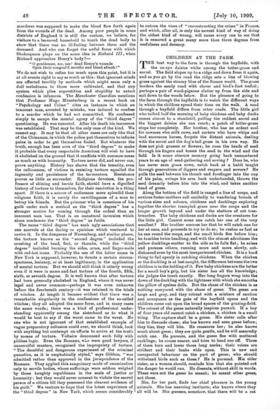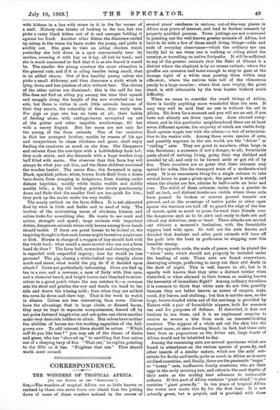CHILDREN AT THE FARM.
THE best way to the farm is through the hayfields, with
the ox-eye daisies white among the totter-grass and sorrel. The field slopes up to a ridge and down from it again, and as you go by the road the ridge sets a line of blowing grass against the steamy blue of the Sussex weald. The grass borders the sandy road with clover and bird's-foot trefoil ; perhaps a pair of wood-pigeons clatter up from- the side and sail down to the woods below. But the pleasure of going to the farm through the hayfields is to watch the different ways in which the children spend their time on the walk. A road through a hayfield differs from other roads. The little girl who talked half the morning of baby chickens and baby ducks comes almost to a standstill, pulling the reddest sorrel and the biggest daisies she can reach; a patch of totter-grass stops her completely. Her brother, who has an ardent soul for cowmen who milk cows, and carters who have whips and lead enormous horses, forgets the distant animals, dealing with the sorrel and the dog's-tail grass in his own way. He does not pick grasses or flowers; he runs the heads of seed through his lingers and tosses the seed to the wind and the field. Is it some obscure memory going back unnumbered years to an age of seed-gathering and sowing ? Does be, who has never sean grass sown, catch back at a habit taught through generations of diggers and reapers and sowers ? He pulls the seed between his thumb and forefinger into the cup of his palm, swings his arm back underhanded, throws the seed dreamily before him into the wind, and takes another head of grass.
Along the bottom of the field is ranged a line of coops, and anxious foster-mothers call excitedly to wandering broods of various sizes and colours, chickens and ducklings exploring together the shorter trampled grass near the coops and the longer growth beyond and under the shelters of cut tree- branches. The baby chickens and ducks are the creatures for the little girl. Cannot some one catch her one of the very smallest ? Her brother assures her that he will catch one for her at once, and proceeds to tiy to do so; be rushes as fast as he can round the coops, and the small birds flee before him; he tumbles twice headlong, and with the utmost adroitness the yellow ducklings scatter to the side as he falls flat ; he arises and pursues others, running more and more slowly, out. distanced even by the most inexperienced chicken. It is a bard thing to fail openly in catching chickens. When the chicken or the duckling is at last caught, the difference between the two children is in the holding of it. Few baby chickens are the better for a small boy's grip, but his sister has all the knowledge; she judges the touch exactly. Her long fingers wrap into the down of the duckling with the lightness with which she smooths the pillow of eyeless dolls. But the chase of the chicken is as nothing compared with the chase of geese. The geese are large and grey, and they retreat with a mixture of caution and annoyance as the gate of the hayfield opens and the children come out upon the broad spaces of the grazing-field. The retreat of the geese naturally inspires pursuit. If a boy of four years old cannot catch a chicken, a chicken is a small thing. The capture shall be a goose. His sister calls after him to dissuade chase; she has known and seen geese before; they hiss, they will bite. He reassures her; he also knows much about geese; they are quite gentle, and he will assuredly catch one. He pursues, and the geese flee with muttered cacklings; he conies nearer, and tries to head one off. Three of them turn and lower three long necks; their voices are strident and their beaks wide open. This is new and unexpected behaviour on the part of geese; who should withstand birds such as these ? He is pursued. His elder sister, as a woman should, reminds him that she pointed out the danger be would run. He dissents, without skill in words. These were not the geese he meant; he meant other geese, not these.
She, for her part, finds her chief pleasure in the young animals. She has unerring instincts; she knows where they all will be. She guesses, somehow, that there will be a cat with kittens in a box with straw in it in the far corner of a stall. Nobody else thinks of looking in the box, but she picks a rusty black kitten out of it and emerges holding it against her frock. Another older kitten she discovers curled up asleep in the warm tin basin under the pump, and picks it swiftly out. She goes to visit an ailing chicken which yesterday she laid down in a spot conveniently near its mother, covering it with bay as it lay, all but its head ; and she is much concerned to find that it is as she feared it would be. The smaller the young creature the more attractive is the general rule, and if it is ailing besides being small, that is an added charm. Out of five healthy young calves she picks a small Alderney, and then discovers a sixth which is lying down and has patches of skin without hair. The claims of the other calves are dismissed ; this is the calf for her. She does not find an ailing pig among the nine that squeak and snuggle along the length of the sow stretched on her side, but there is virtue in such little animals because of their tiny snouts, the rotundity of them, their curly tails.
For pigs as pigs she has no taste at ; their habits of feeding alone, with cabbage-leaves scrunched up out of the gutter and other impolite swallowings, fill her with a merry disgust. But her cares are not only for the young of the farm animals. One of her anxieties is that her youngest brother, unable by reason of his age and inexperience to chase chickens and geese, shall enjoy feeding the creatures as much as she does. She disappears and returns from the cow-byre with a hobbledehoy farm lad ; they scale stairs, and she descends with a huge wooden trug half filled with maize. She observes that this farm boy will always do what you ask him, and the three children surround the wooden basket. The maize flies ; the farmyard is agog. Black, speckled, yellow, white, brown fowls flock from a dozen barn-doors, from scraping in hedgerows, from dusting under distant hayricks ; muddy white ducks waddle and dabble muddy bills; a big old turkey gobbler struts ponderously down and finds that the smaller fowl are too quick for him ; they peck up the maize under his very wattle.
The manly outlook on the farm differs. It is not attracted first by what is little and feeble and in need of help. The brother of the ministering nurse of chickens, kittens, and calves looks for something else. He wants to see work and action, strength aud speed ; large animals with important duties, dangerous animals whom only heroes among farm hands should tackle. If there are great horses to be looked at, the inspiring thought is that such horses m ight be restive, m ight rear or kick. Horses in charge of a waggon of hay should bolt with the whole load; what would a mere mortal who was not a farm hand do then ? The farm bull, somnolent and chewing clover, is regarded with respectful inquiry ; how far would he toss persons? The pig, closing a white-lashed eye sleepily above muck and straw, what would the pig do if it decided upon attack ? Cows are particularly interesting. Cows are tied up ten in a row, and a cowman, a man of forty with blue eyes, and a close-cut beard, and bright brown hair bleached to straw- colour in a great patch where the sun catches it,—a cowman sets his stool and gentles the cow and bends his head to her side and draws the hissing milk ; then when they are milked the cows lie down and chew hay. That is the work to watch in silence. Calves are less interesting than cows. Calves have the advantage that in large sheds, or disused barns, they may be kept in separate compartments, fenced off by ash-poles fastened lengthwise, and ash-poles one above another make very desirable ladders to climb. But calves have neither the abilities of horses nor the working capacities of the full- grown cow. To add interest, there should be action. "Which calf do you like best ? " you may ask of the chaser of ducks and geese, who has "shoo-ed up" to unwilling feet four calves out of a sleeping bevy of five. " That one," he replies, pointing to the fifth as it lies. "Frighten that one." Thus should worth meet reward.











































 Previous page
Previous page